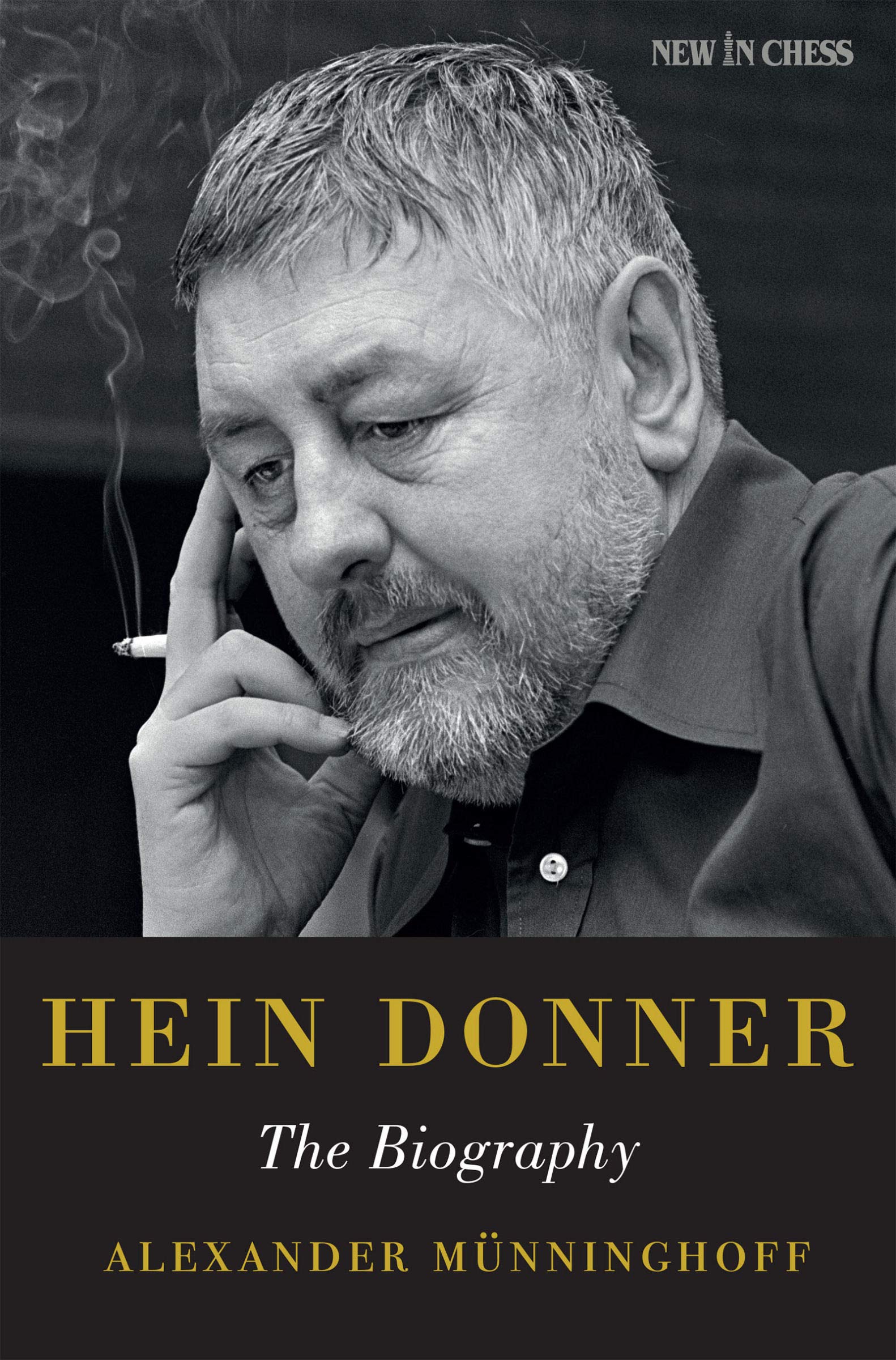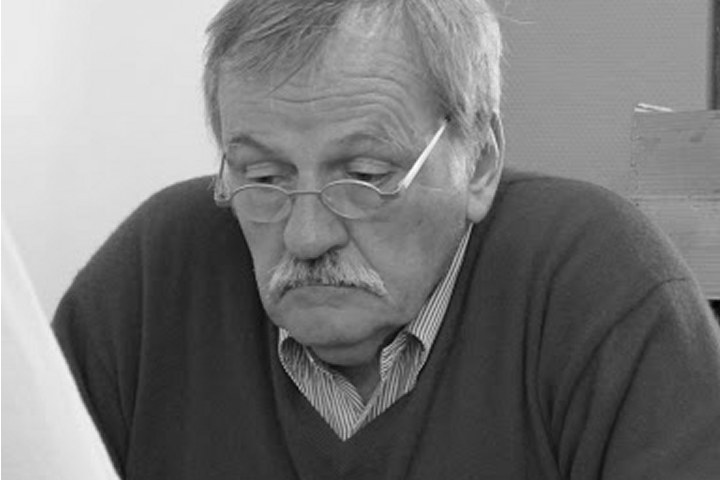
Hein Donner : The Biography : Alexander Münninghoff

“Alexander Münninghoff is an award-winning author from the Netherlands. He wrote the acclaimed biography of the man that was dethroned by Hein Donner as Dutch champion: former World Chess Champion Max Euwe. His memoir The Son and Heir, which tells the complex story of the Münninghoff family in the 20th century, is an international bestseller.”
From the rear cover :
“Hein Donner (1927-1988) was a Dutch Grandmaster and one the greatest writers on chess of all time. He was born into a prominent Calvinistic family of lawyers in The Hague.
His father, who had been the Minister of Justice and later became President of the Dutch Supreme Court, detected a keen legal talent in his son. But Hein opted for a bohemian lifestyle as a chess professional and journalist. He scored several excellent tournament victories but never quite fulfilled the promise of his chess talent.
Hein Donner developed from a chess player-writer into a writer-chess player. His provocative writings and his colourful persona made him a national celebrity during the roaring sixties. His book ‘The King’, a fascinating and often hilarious anthology spanning 30 years of chess writing, is a world-wide bestseller and features on many people’s list of favourite chess books. The author Harry Mulisch, his best friend, immortalized Hein Donner in his magnum opus The Discovery of Heaven. In 2001 the book was adapted for film, with Stephen Fry playing the part that was based on Donner. Included in Hein Donner is the interview in which Harry Mulisch tells about his friendship with Donner.
After suffering a stroke at the age of 56, Donner lived his final years in a nursing home. He continued writing however, typing with one finger, and won one of the Netherlands’ most prestigious literary awards. Alexander Münninghoff has written a captivating biography of a controversial man and the turbulent time and age he lived in.”
First, a bit of background. This biography was originally published in Dutch in 1994. Only now, a quarter of a century later, has it appeared in an English translation, partly in response to the success of The King, a collection of Donner’s writings.
Sadly, Alexander Münninghoff died at the age of 76 on 28 April this year, just before the publication of this book.
Johannes Hendrikus Donner (Jan Hein to the chess world, Hein to his friends) was one of the most colourful and controversial chess players of his time. His family have been for many years prominent in politics and law: his father was a government minister, his oldest brother was President of the European Court of Justice, and his nephew also a government minister. It was clear from an early age that Jan Hein was different. Troublesome and obnoxious, lazy but gifted. His father had him assessed by a professor of psychology who found him ‘very egocentric and immature/unbalanced’, with ‘a certain angst, with, in contrast, an inclination towards narcissism, and a sense of inferiority, with, in contrast, an inclination to act tough’.
Possibly the ideal combination of attributes for a chess player and journalist.
What should we make of a man who donated his prize from Venice 1968 to the Viet Cong, on the condition that the proceeds were used to buy machine guns rather than medicines? A man who wrote that women were hopeless at chess and would never learn? A man who used his chess columns to insult his fellow Dutch players, most notably a long running feud with his older contemporary Lodewijk Prins?
Someone, I think, who was deliberately provocative, who spoke and acted to gain a response more than anything else.
Like everyone else, I found The King highly entertaining, but my enjoyment was tempered by the feeling that he was someone I wouldn’t have liked had I known him.
Münninghoff, however, knew him and clearly liked him, and, as an outstanding writer and journalist, was the ideal person to tell the story of Donner’s relatively short but eventful life. This is a conventional biography, following his life from birth to death and, as you might expect, is crammed full of entertaining anecdotes. We learn a lot about his often chaotic personal life (he was married three times) as well as his career both as a chess player and a journalist. There’s also a lot of fascinating information about chess in the Netherlands during the post war decades. It’s not an academic biography, though: a rather inadequate index of names, no sources and few footnotes (I’d have welcomed more).
You might have expected a colourful and provocative player to have a similarly colourful and provocative style, but in fact his play was mostly rather dull, with a lot of short draws. His results were wildly erratic: at his best he could win strong grandmaster tournaments, but these triumphs would be interspersed with disasters. He had wins to his credit against most of the top non-Russians, even including Fischer, but an abysmal record against Soviet grandmasters. (Looking at his games in MegaBase it’s also notable how well he scored against English opponents.) He was also famous for losing a remarkable number of miniatures.
Even so, the games selection at the end is slightly disappointing. Games are sometimes discussed in the text but don’t appear in the book. One example is his 1957 win over Troianescu, which he considered one of his best:
On p128 we’re told that his 1961 loss to Korchnoi appears at the back of the book as game 23. No, it doesn’t: the index tells us Viktor is on p259, but neither he nor the game is anywhere to be seen.
I’m always happy to oblige:
What we actually get is a short collection of 18 games with brief annotations: wins, losses and draws, followed by another 16 short defeats, intended as a supplement to Tim Krabbé’s collection which you can find online here.
Donner would have been amused that his biography should contain more embarrassing defeats than brilliant victories. “I love all positions. Give me a difficult positional game, I’ll play it. Give me a bad position, I’ll defend it. Openings, endgames, complicated positions, and dull, drawn positions, I love them all and will give my best efforts. But totally winning positions I cannot stand.”
Anyone who was following international chess between the 1950s and the 1970s will undoubtedly want to read this book. For younger readers it will be ancient history, but still a highly entertaining read.
If you’ve read The King this book will need no recommendation from me, and, likewise, if you’ve read this book you certainly won’t want to miss The King.
A thoroughly enjoyable, if informal, biography of a fascinating and unusual personality which comes highly recommended, but is slightly let down by the rather perfunctory games section.
Richard James, Twickenham 6th August 2020

Book Details :
- Paperback : 272 pages
- Publisher:New in Chess (15 July 2020)
- Language: English
- ISBN-10: 9056918923
- ISBN-13: 978-9056918927
- Product Dimensions: 14.6 x 1.9 x 21.6 cm
Official web site of New in Chess

